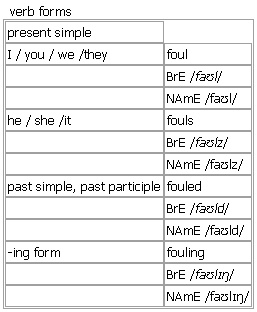 foul
foul

foul [foul fouls fouled fouling fouler foulest] adjective, verb, noun BrE [faʊl] NAmE [faʊl] adjective
(foul·er, foul·est)
1. dirty and smelling bad
•foul air/breath
•a foul-smelling prison
•Foul drinking water was blamed for the epidemic.
2. (especially BrE)very unpleasant; very bad
•She's in a foul mood.
•His boss has a foul temper.
•This tastes foul.
3. (of language)including rude words and swearing
Syn: ↑offensive
•foul language
•I'm sick of her foul mouth (= habit of swearing).
•He called her the foulest names imaginable.
4. (of weather)very bad, with strong winds and rain
•a foul night
5. (literary)very evil or cruel
Syn: ↑abominable
•a foul crime/murder
more at cry foul at ↑cry v., by fair means or foul at ↑fair adj.
Word Origin:
Old English fūl, of Germanic origin; related to Old Norse fúll ‘foul’, Dutch vuil ‘dirty’, and German faul ‘rotten, lazy’, from an Indo-European root shared by Latin pus, Greek puos ‘pus’, and Latin putere ‘to stink’.
Synonyms:
disgusting
foul • revolting • repulsive • offensive • gross
These words all describe sth, especially a smell, taste or habit, that is extremely unpleasant and often makes you feel slightly ill.
disgusting • extremely unpleasant and making you feel slightly ill: ▪ What a disgusting smell!
foul • dirty, and tasting or smelling bad: ▪ She could smell his foul breath.
revolting • extremely unpleasant and making you feel slightly ill: ▪ The stew looked revolting.
disgusting or revolting?
Both of these words are used to describe things that smell and taste unpleasant, unpleasant personal habits and people who have them. There is no real difference in meaning, but disgusting is more frequent, especially in spoken English.
repulsive • (rather formal) extremely unpleasant in a way that offends you or makes you feel slightly ill. Repulsive usually describes people, their behaviour or habits, which you may find offensive for physical or moral reasons.
offensive • (formal) (especially of smells) extremely unpleasant.
gross • (informal) (of a smell, taste or personal habit) extremely unpleasant.
disgusting/repulsive/offensive to sb
to find sb/sth disgusting/revolting/repulsive/offensive
to smell/taste disgusting/foul/gross
a(n) disgusting/foul/revolting/offensive/gross smell
a disgusting/revolting/gross habit
disgusting/offensive/gross behaviour
a disgusting/revolting/repulsive man/woman/person
Example Bank:
•His boss has a foul temper.
•I'm sick of her foul mouth.
•She could smell his foul breath.
•She exploded in a torrent of foul language.
•The air in the cell was foul.
•This tastes foul!
•a vile/foul smell
•in a vile/foul temper
•vile/foul weather/breath
Idiom: ↑fall foul of somebody
Derived Words: ↑foully ▪ ↑foulness
Derived: ↑foul something up ▪ ↑foul up
verb
1. transitive ~ sb (in sport)to do sth to another player that is against the rules of the game
•He was fouled inside the penalty area.
2. intransitive, transitive ~ (sth) (in ↑baseball)to hit the ball outside the playing area
3. transitive ~ sth to make sth dirty, especially with waste matter from the body
•Do not permit your dog to foul the grass.
•More and more beaches are being fouled by oil leakages.
4. transitive, intransitive to become caught or twisted in sth and stop it working or moving
•~ sth (up) The rope fouled the propeller.
•The line became fouled in (= became twisted in) the propeller.
•~ (up) A rope fouled up (= became twisted) as we pulled the sail down.
Verb forms: 
Word Origin:
Old English fūl, of Germanic origin; related to Old Norse fúll ‘foul’, Dutch vuil ‘dirty’, and German faul ‘rotten, lazy’, from an Indo-European root shared by Latin pus, Greek puos ‘pus’, and Latin putere ‘to stink’.
noun (in sport)
an action that is against the rules of the game
•It was a clear foul by Ford on the goalkeeper.
• (NAmE)to hit a foul (= in ↑baseball, a ball that is too far left or right, outside the lines that mark the side of the field)
see also ↑professional foul
Word Origin:
Old English fūl, of Germanic origin; related to Old Norse fúll ‘foul’, Dutch vuil ‘dirty’, and German faul ‘rotten, lazy’, from an Indo-European root shared by Latin pus, Greek puos ‘pus’, and Latin putere ‘to stink’.
Example Bank:
•He committed a second clear foul and was sent off.
•He drew a fourth foul on Camby.
•He was sent off for a blatant foul on Giggs.
•The referee did not call a foul on the player.
|
|
